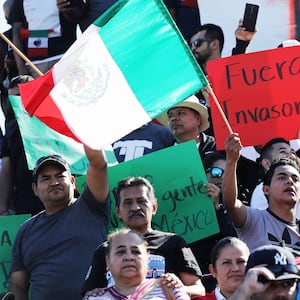TIJUANA, Mexico—A dowsing with hot coffee, a sucker punch, angry threats, peltings with sticks and stones.
Migrants who have journeyed from Central America to this border city seeking refuge from violence back home have encountered unexpected violence and harassment here. More than 3,000 migrants have arrived in Tijuana since Wednesday—a rate of arrival that city officials say is without precedent in the history of the city known as the “City of Migrants.” The migrants formed part of the Central American caravan seeking political asylum in the U.S.
The caravan’s highly publicized arrival has generated a nationalist backlash from a segment of residents here that views the migrants as a threat to public safety, and as unwanted competition for jobs and public services.
It has led to a kind of siege mentality inside the emergency shelter where they have taken refuge.
The first sign of violence was on Wednesday night when a crowd of angry residents from an affluent coastal part of the city known as Playas de Tijuana confronted migrants who had gathered there to spend the night at a local park.
“They said we snored and that we stink and about 20 of them threw stones at us,” said 14-year-old Lineth Viera, from Honduras, who was at Playas that night with her father and brother.
Children account for approximately 21 percent of the migrants in Tijuana, according to a city official who oversees data from the shelter’s registry.

Tents set up in Tijuana, Mexico.
Jason McGahan/The Daily BeastTwo construction workers from Honduras who traveled together in the caravan told me that a woman in the crowd at Playas threw hot coffee at them from a thermos.
Seven migrants were arrested on charges of public disorder, including several for reportedly smoking marijuana on the beach. Videos of the melee went viral.
In response to the disorder, the city converted a municipal sports complex near downtown to an emergency shelter where the migrants could gather together at one location. For days police have blocked all road access to the shelter and maintained a 24-hour security detail in the area. Migrants say it hasn’t stopped the violent attacks against them.
On Friday at around 8 p.m., a local man sucker-punched a migrant who was standing in a line for humanitarian aid outside the shelter, according several migrants who were in the area at the time.
“The man had been drinking, he told us we weren’t wanted here. Then punched the man in the face,” said Marvin Guevara, a 26-year-old Honduran who said he was standing in the line near the man at the time.
Migrants said police intervened and removed the man from the area. A senior police official said no arrests have been made outside the shelter.
Migrants say that opponents of the caravan harassed and threatened them into early Saturday morning. At around 1 a.m. migrants say a group of assailants threatened them from the fence of a baseball park inside the sports complex where the migrants were camped for the night. There were small children sleeping in the area. No city official confirmed the account, though migrants said police intervened and prevented the alleged assailants from throwing rocks.
Police did confirm that in a separate incident, a group shouted threats and pelted the metal roof of the gymnasium with what one migrant from Honduras described as “sticks and stones.” There were no arrests, and the matter remains under investigation, the police official said.
“We didn’t sleep all night because we were scared they’d come back,” said Karen Antunes, a Honduran woman who is staying at the shelter in Tijuana with her 11-year-old son.
Antunes fled Honduras a month ago fearing retaliation for the government after taking part in a nationwide wave of protests following allegations of voter fraud in the election of President Juan Orlando Hernández.
She compared the feeling inside the complex to “un asedio,” (“a siege”).
On Sunday, anti-caravan protesters clashed with riot police near the shelter, vowing to “sacar los migrantes de allí” (“get the migrants out of there”). Migrants at the shelter were kept on lockdown for hours while protesters overturned concrete barriers put in place for crowd control and threw plastic bottles and trash at a helmeted line of police with riot shields.
Protesters decried the migrants as “invaders” and “ingrates.” Behind the police lines, migrants were restricted from leaving the shelter. Dozens of them huddled inside a fence.

Crowd in Tijuana, Mexico.
Jason McGahan/The Daily Beast“There is no water to drink,” said Josue Ayala, a 37-year-old agronomist from El Salvador.
“We haven’t eaten since yesterday,” said José Reyes, a 30-year-old farm laborer from Honduras.
When a man who lives in the neighborhood brought a case of mineral water to the fence, the migrants swarmed and the water bottles were gone in seconds.
Police have barred the delivery of humanitarian supplies inside the gates of the shelter, especially food. City officials point to threats made on Facebook to poison the migrants’ food as reason for the precaution. Migrants must leave the shelter to receive food from churches, volunteers, and other charities.
The more aggressive the protests and harassment, they say, the more tightly police restrict movement in and out of the shelter. And the city’s supply of food and water at the shelter is inadequate to meet the growing need.
“There is no food, no toilet paper, no water, no blankets,” said Gladys Cardoza, a 39-year-old from Honduras who is traveling with her teenage son. “We’ve had to go out in the street and rely on good Samaritans for help.”
Among the migrants who sleep at night in the outfield of the baseball park, many have no tent, tarp, or other form of shelter. They sleep in the open air on camp mattresses or a blanket. Low temperatures at night are forecast to dip into the 40s this week, with a likelihood of rain on Thursday.
César Palencia, the city official who is heading the relief effort, said the city is heading up the effort with “zero” assistance from the federal government. “We will continue to do all we can,” he said.
On Monday, city officials who oversee the shelter started a new process that allows bottles of water and other non-perishable goods into the shelter after a review by officials. Palencia said the city has also begun a process to allow prepared food into the shelter. A medical tent from the state health department was also performing health checkups.
Migrants told The Daily Beast that conditions inside the shelter have improved significantly since anti-immigrant protests that made international news concluded on Sunday evening. City officials are, however, closely enforcing previous limits on press access to the shelter, restricting reporters to one hour of access in the morning and one in the afternoon.
Palencia acknowledged the existence of what he called “ill will” against the migrants and said city officials have “asked them to remain calm and not harm the migrants.”
Public resentment against the migrants has been fueled in part by comments from Tijuana’s mayor, José Manuel Gastélum, who accused migrants in the caravan of being violent, crude, and “mariguanos” (“stoners”). Gastélum vowed to conduct an inquiry to decide if the city will continue to welcome them.
Gastélum said the city may not have the resources to continue to shelter and support the caravan. President Trump in a tweet likened Gastélum’s concerns about the caravan to the president’s own.
But migrants sheltered at the sports complex in Tijuana say the city is sending a mixed message and that the protection they are receiving feels to them at times more like a quarantine.
Dire fears are gaining traction in the shelter that protesters will force their way into the shelter and remove the migrants by force.
Reyes, the farm laborer from Honduras, says it feels as though the entire city is against them.
“We don’t feel safe in here,” Reyes said through the bars in the fence. “It seems like they want to provoke a confrontation, and there are many women and children in here.”






